How random words make perfect sense
On tricking our cognitive biases to aid us with our storytelling
So there you are, exploring the Forbidden Library, you grab a dusty tome from the shelf and ask the oracle, “What is this book about?” and you get “Condense” and “Kingdom”. For someone jumping into your story at this moment, those two words could mean anything (or nothing at all). But for you… Ah, for you, it makes total sense! It is, of course, the book explaining how Queen Atoniah managed to defeat the Crimson Army and claim dominance over the Verdant Expanse.
This is one of my favorite aspects of playing solo RPGs. The magical moment when you roll a bunch of random words from an oracle, and they seem to somewhat supernaturally fit your narrative, with just that perfect balance between introducing a surprising element and confirming our expectations (surprise and expectation; keep these words in mind, they’ll be important soon).
Coming up with those interpretations takes some practice, and it is, fairly, an aspect that may seem daunting to new players coming into solo RPGs. But I’d argue that we start having more fun with oracles when we lean harder into some tendencies of human cognition, namely apophenia and confirmation bias.

Our weird little brains
Although these two psychological phenomena may have serious implications (and dangers) in the real world, they can be a useful tool for your games, both as a player and as a designer. Stick with me here.
Apophenia
Apophenia is, as you know, our tendency to see patterns and connections between unrelated things. This process can manifest as playful, harmless activities such as seeing shapes in clouds, but also as more troubling experiences, such as instigating conspiracy beliefs. For our games we are, obviously, aiming for the former.
When we roll a random entry on a table, we can’t help but start weaving that result into the narrative we created up to this point. It seems that it was meant to be! Of course, we can emphasize and facilitate that feeling by crafting evocative tables for our games.
If you are designing a setting of courtly intrigue, creating a table with words such as “Treason”, “Affair”, “Pledge”, “Secret Heir”, “Broken Alliance”, “Blackmail” will certainly help evoke the themes of the game. Perhaps my example is too on the nose, but the point is: do not underestimate the power of choosing the right entries for your oracle tables.
(And just to clarify, I am not talking here about specific tables that give you a more precise statement for a given context, such as “A member of your family suddenly returns”, which are lovely, and also fine to have in your game. I am talking about what some people call ‘spark tables’, which offer just a word or two, and rely more heavily on the context and the player’s interpretation to make any sense.)
Connecting the dots is an intrinsic behavior, and we can nudge and shape that phenomenon with a clever use of (not so) random words.
Confirmation bias
Given the world we live in, I don’t think I need to explain how harmful confirmation bias can be to our society, but just in case: our knack for favoring information that reinforces our existing beliefs can lead (and has led) to a lot of prejudice, misinformation and suffering. So to be extra clear: I am not advocating to foment confirmation bias outside the scope of solo play, please and thank you.
However, for our thought experiment, we are taking this cognitive process as a resource to enhance storytelling and facilitate our use of the oracle tool.
If our narrative so far led us to believe that the Bone Mage is evil and wicked, when we finally meet him, and he’s about to explain his plans, we ask the oracle “What’s his motivation?” and we get “Seek” and “Destruction”, boom. We go, “I knew it! Of course! He wants to kill everyone”
With the very same results and a different framing (say, we had evidence that he would be our savior), we could interpret “seek destruction” as “obviously, he is trying to bring down the corrupt powers that plague our lands!”

Of course, a random roll could just as well challenge our previous assumptions, and that is awesome too, if you are able to incorporate that curveball and enrich (not halt) your story with it. What I am saying is, if you are afraid of not making sense out of an oracle result, lean into your preexisting hypotheses without a fear. Let the dice confirm what you already believed.
I’ve seen many players overwhelmed by the false need to add an extra layer of mystery with every single oracle roll. I am telling you: the plot doesn’t need to thicken all the time. Allow yourself to close threads and to confirm theories.
Now, well-crafted tables might help here too, although I believe the role of the designer is less influential (I might be wrong, though). All I can say is that a good selection of words fall into that sweet spot between vague and evocative. They will inspire the player, but not dictate one possible interpretation over the other. We want players to feel clever. And that leads me to my next point.
My current experiment
I am currently designing Wraithound, a solo/coop game about ghost hunters delving into eerie manors to investigate supernatural phenomena and face the horrors that plague that place.
Now, one word sticks out from that description for the purpose of our discussion: investigate.
The player is going through the haunted mansion and trying to piece together the cause of the haunting, and even the motivation of the apparition itself. So, how do you come to the “right” conclusion without a hard-coded answer or a GM to confirm it to you?
Many games have tried different approaches (from the top of my head, I’m thinking of Brindlewood Bay’s Theorize move, and the very cool Nine Steps and a Bloody Heart system for solo investigation). For Wraithound, however, I wasn’t interested in a way to test if your assumptions are right or wrong. I wanted to facilitate the feeling of pieces falling into place. The pleasure of seeing random events being connected through your conjectures into a somewhat cohesive whole. I wanted you to feel clever.
So here’s what I devised: a “prophecy/riddle” oracle. You roll six words at once, and connect them to form a sentence that sounds cryptic, somewhat impenetrable, but that gives the sensation that perhaps there’s a meaning behind it. When coming up with those tables, I tried to follow my tips of using evocative yet vague words tailored for the setting.
(Side note: I created a dedicated VTT for the game, including an automated roll for the oracle, check it out how cool it looks:)
The manor is represented by a 3x3 grid of cards, with 3 cards on each slot. As you go about your exploration, you reveal the cards to discover the room you are in, a curiosity you may investigate, and a threat or horror you must face.
Let’s focus on the second one: curiosities are strange phenomena or artifacts that prompt you with a leading question. Here’s an example:
Flickering lights cast shifting shadows. What message do they conceal?
At this point, you can come up with something on your own, ignore it, or (my favorite option) ask the oracle. Let’s say you do that and get the following:
Channel the dark history despite the maze that falls.
Then you start hypothesizing. If it is earlier in the game, you still don’t have expectations or previous experiences to connect the sentence to, so you may come up with a few theories. Perhaps the secrets (maze) of this place are being destroyed (falls), but the entities still want to tell you (channel) about its eerie past (dark history)?
(Quick tip: you don’t need to actually incorporate the words you rolled on an oracle into your interpretation. If they sparked your imagination, their job is done. Go with your gut, and don’t ever feel like you’re “cheating” for not using the actual words you got.)
As you move on, new curiosities and subsequent oracle rolls will start to feed into each other, and by the time you face the final boss (the entity responsible for the haunting), you’ll have a rich story of this manor, their past inhabitants and the reasons for the spectral phenomena.
And how is it any different?
Now, you might say that the prophecy/riddle oracle is not different from any other action+theme oracle we can find in a myriad of other games. And you’d be right, to an extent. However, I’d argue that the vibes are a crucial factor for the success of this tool.
See, you are a powerful ghost hunter recruited by an ancient order, you have your own personal drives, and you step into a place full of history and mystery. Somehow, devising your conjectures through prophecy-like sentences makes this world seem more vivid, more tangible, at least for me.
Combine that with the fact that you roll six words at once, and I believe the oracle does contribute to the goal of making the player feel like an investigator. There’s enough context for you to confirm previous hypotheses, but also there’s enough room for you to be surprised by your discoveries.
Surprise and expectation.
This is my formula for the player to feel clever. A combination of reinforcing your beliefs (confirmation bias) and revealing a connection between previously unrelated facts (apophenia). At the same time, you are embracing and subverting expectations.
For Wraithound, I don’t feel the need to add a roll to confirm your theories. It is not a game about finding the right answer. It is a game about building the right answer through branching theories that eventually intertwine and create a beautiful mosaic.
There’s a lot more I could say about these oracles (seriously, I can’t stop thinking about them), but I’d like to hear from you. How do you feel about open-ended oracles? Have you felt those cognitive tendencies manifesting when using them? Do you fight it back, or do you lean into them? Let me know in the comments below!
And If you are curious to see how this tool works together with the other game mechanics, check out Wraithound. It is currently funding, and I’d love to have your support!




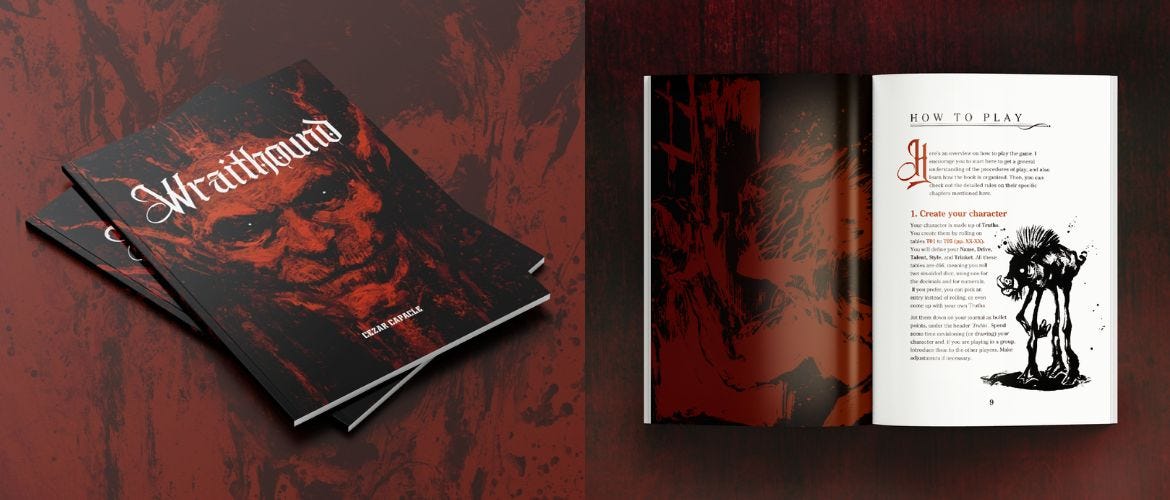
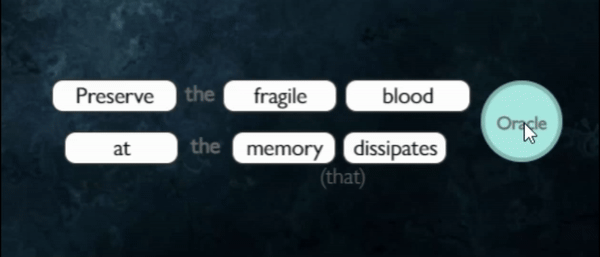
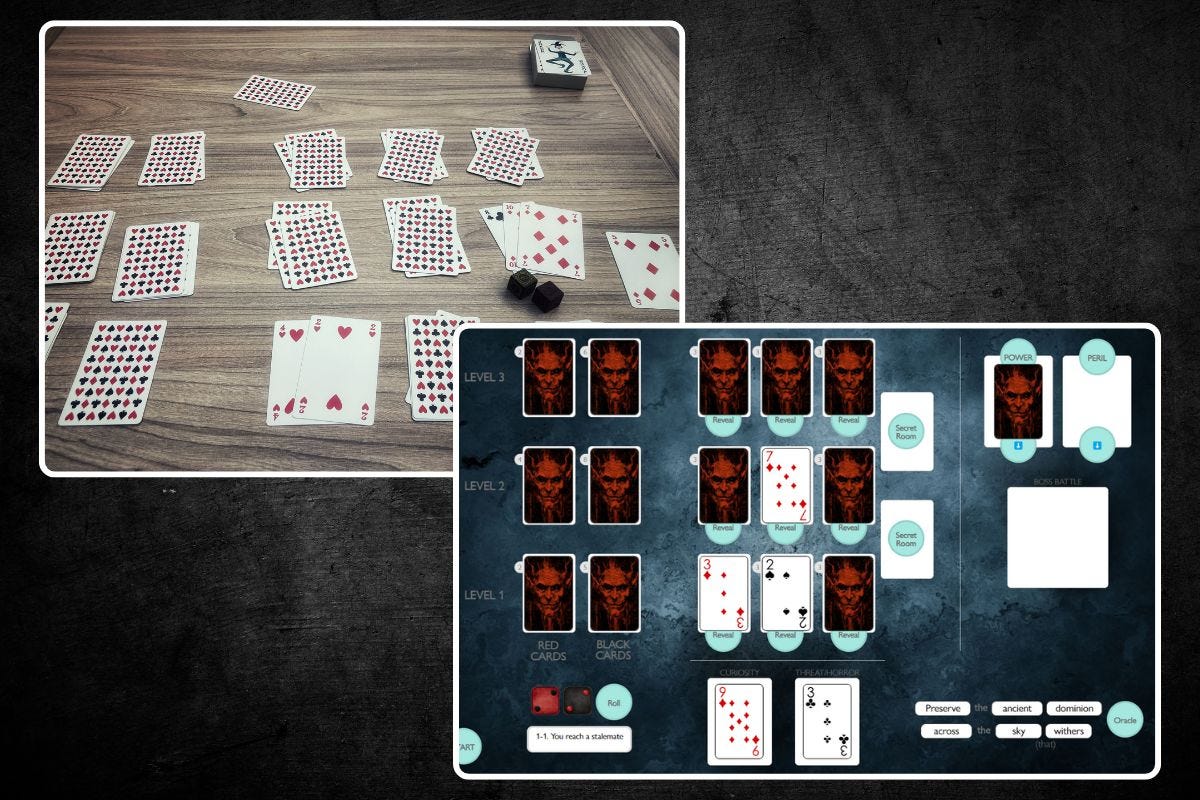
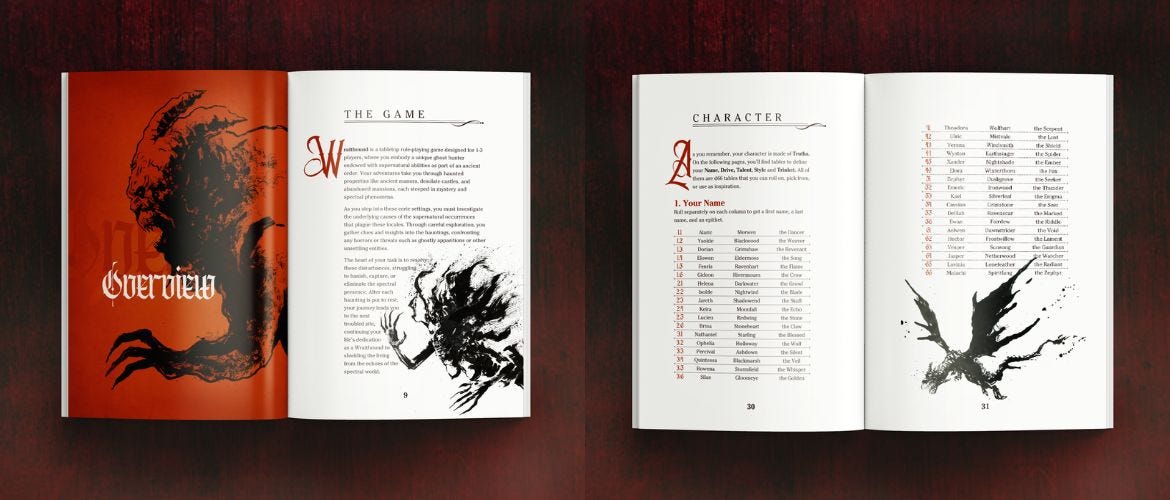
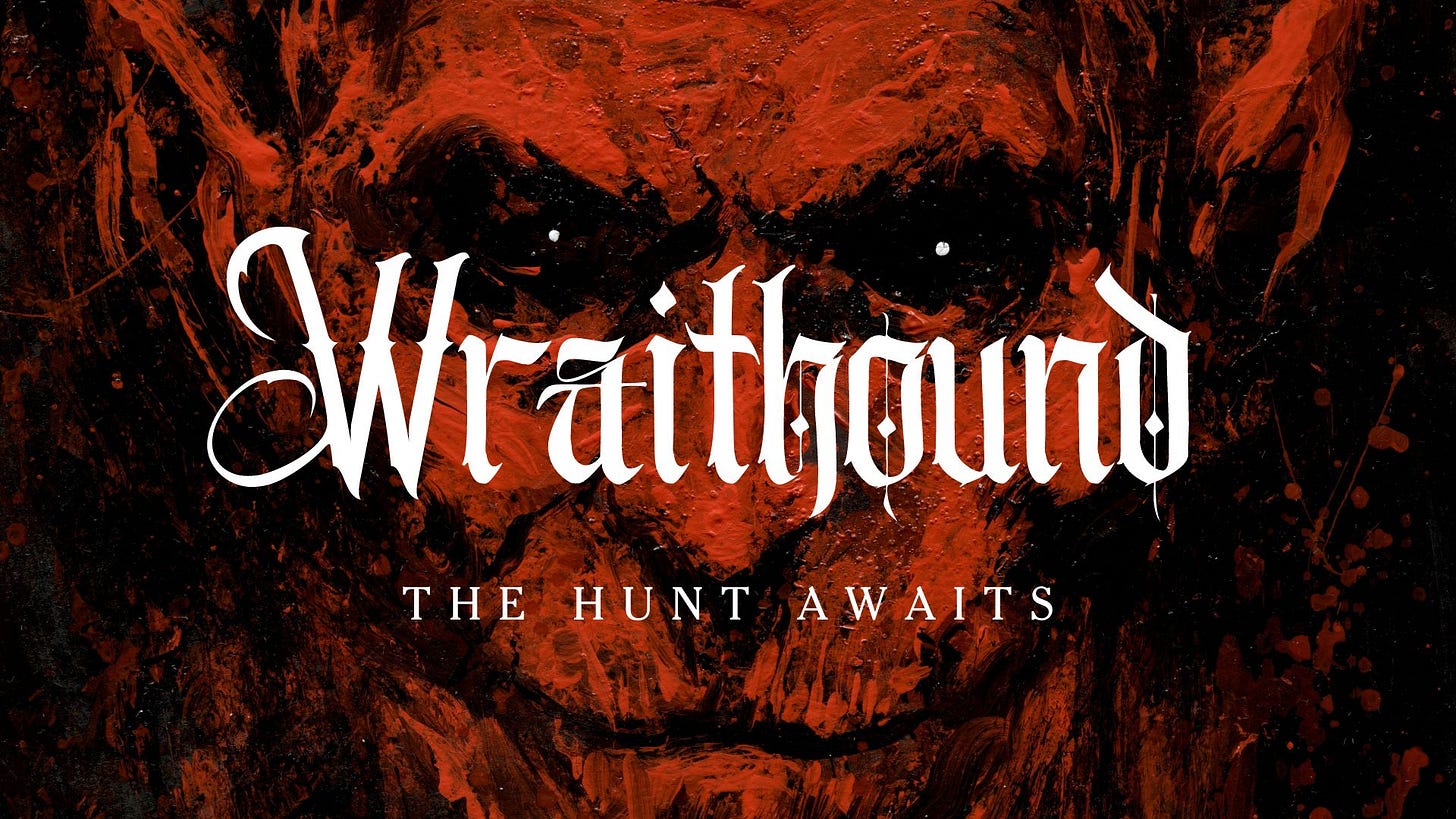
Personally I have always struggled with action/theme oracles. When its working for me its great, but inevitably I hit a brick wall at some point and end up rolling too many dice through exasperation. I love the idea of your prophecy/riddle oracle. Its not so frightening as two random words that sometimes (to my mind) wont fit my story no matter what. The idea of figuring out a riddle is more appealing to me and game like.
My main struggle when playing solo is the control balance. I want to feel like an outside force is controlling the world whilst also giving my character as much freedom of action as possible. Any tool that helps with that is the prize for me!
So glad I read this. I immediately ordered a copy of Wraithhound.